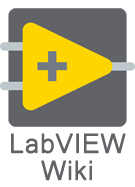VIWeek 2020
| VIWeek 2020 | |
|---|---|

| |
| 17-23rd May 2020 | |
| VIWeek 2020 Homepage |
VIWeek is a free community-led virtual event that was first held in 2020 at the time NIWeek would have taken place. The content focuses on both LabVIEW and good software engineering practices. All the sessions are hosted individually by the presenters themselves.
|
Discussions during presentations happened here: https://discord.gg/a4WA8Bm |
|---|
History
DSH Workshops had planned to hold a number of workshops at and around NIWeek 2020. Due to the COVID-19 situation, and seeing as NI had also cancelled all live, in-person events, the workshops had to be cancelled, too. In order to entertain the community and keep in touch with their friends, the team (Fabiola De la Cueva, Steve Watts, Joerg Hampel and Brian Powell) decided to hold a series of live, virtual sessions during the week formerly know as NIWeek.
Conversation about these sessions led other LabVIEW Champions and Community leaders to throw around the idea of a new community-led virtual event. When Steve Watts went on to advertise this idea on his blog, VI Week was born. There are many community members to thank, see the #Special Thanks section below.
Timeline
The speed and simplicity of how this event came together is a testament to the LabVIEW community. It took only about a week to get from the first thoughts to a finalised agenda and an understanding of how to execute the whole event:
- Mid-April: DSH Workshops decides to hold a series of virtual sessions.
- April 30: DSH Workshops publishes their events under the #Virtual NIWeek hashtag.
- May 2: Chris Stryker coins the term #VIWeek, based on the original #Virtual NIWeek.
- May 3: Steve Watts publishes his blog post.
- May 7: Enough presentations to fill all 5 originally planned days of NIWeek.[1]
By May 17, the first day of the event, the community has not only come up with now 6 days worth of content, but also agreed on both a plan and tools for organising, advertising, holding, streaming and recording the presentations.
- Introduction to VIWeek by Chris Cilino
Presentations (video)
Note: Click the topics below to watch the videos.
Sunday, 17th May 2020
- GCentral: State of the Union and Rolling Up Your Sleeves by Chris Cilino and Danielle Jobe
- LabVIEW FPGA for high throughput applications by Terry Stratoudakis
- Functional programming inspired object-oriented template in LabVIEW + SOLID by Piotr Kruczkowski (LinkedIn Article)
Monday, 18th May 2020
- Pragmatic SW Engineering by DSH Gang: Fabiola De la Cueva, Steve Watts, Joerg Hampel, & Brian Powell
- Philosophy of Coding - How to be a CraftsPerson by Sam Taggart
- Confessions of a Retired Superhero by Matt Pollock
Tuesday, 19th May 2020
- Proper way to communicate over serial by Tim Robinson
- Raspberry Pi / LABVIEW CE and Sensors by Sam Sharp
- Linx Toolkit for Intermediate Robotics with Raspberry Pi by Derrick Bommarito
- FPGA Advanced Sessions to create a versatile FPGA-based acquisition system by Cyril Gambini
- 8 Reasons for encapsulating your next device driver inside a DQMH module by Christopher Farmer
Wednesday, 20th May 2020
- DQMH 5.0 Introduction by DSH - Fabiola De la Cueva & Joerg Hampel
- Efficient Programming in LabVIEW by Tom McQuillan
- Using a Message Broker with DQMH Actors for High Speed/Throughput Data logging by Chris Roebuck and Becky Linton
- Graphical programming beyond G - Use case of LabVIEW integration with Node-RED by Michal Radziwon
Thursday, 21st May 2020
- CEF (configuration editor framework) by Sreejith Sreenivasan & Vikas Koujalagi
- Using the new TLS/SSL functions in LabVIEW 2020 by Sam Sharp
- Soft Skills for Software Engineers by DSH Gang: Fabiola De la Cueva, Steve Watts, Joerg Hampel, & Brian Powell
Friday, 22nd May 2020
- VIWeek – Open Your Instruments With A G Interfaces HAL In LV2020 (No Lever Tool Required!!) by Jonathan Hird (Jono)
- The Core Framework by Denis Stavila
- Mock Object Framework by Sam Taggart
Saturday, 23rd May 2020
- Fast and Simple Unit Testing with Caraya 1.0 by Francois Normandin and Jim Kring
Special Thanks
- Chris Stryker for the name.
- Steve Watts for the organization.
- Derrick Bommarito for the web portal.
- Michal Radziwon for the Discord chat server.
- Quentin "Q" Alldredge for the Logo.
- Michael Avaliotis of VIShots for the video recording.
- All of the presenters
- And many more who will hopefully be added to this list.
References
- ↑ LinkedIn Post, Joerg Hampel, May 7th 2020
